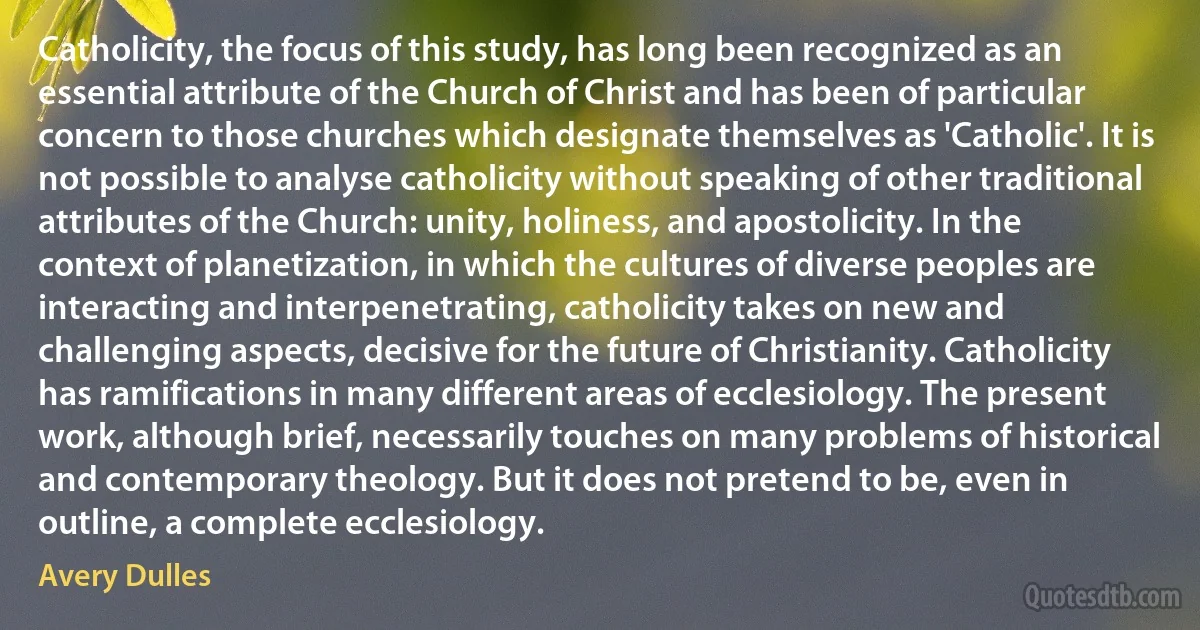
Catholicity, the focus of this study, has long been recognized as an essential attribute of the Church of Christ and has been of particular concern to those churches which designate themselves as 'Catholic'. It is not possible to analyse catholicity without speaking of other traditional attributes of the Church: unity, holiness, and apostolicity. In the context of planetization, in which the cultures of diverse peoples are interacting and interpenetrating, catholicity takes on new and challenging aspects, decisive for the future of Christianity. Catholicity has ramifications in many different areas of ecclesiology. The present work, although brief, necessarily touches on many problems of historical and contemporary theology. But it does not pretend to be, even in outline, a complete ecclesiology.
Avery DullesRelated topics
analyse catholicity challenging christ church contemporary context different future historical outline possible present pretend speaking study theology traditional work peoplesRelated quotes
Hinduism always used violence as creed. For Hinduism, for Hindu dharma, resolving of a conflict is only by killing. There is no other discourse. Debate is not there. You have to kill the enemy. Whereas Buddha believed in discourse and resolving the conflict. So in a system where you have the two streams of thought, debate and discourse, human rights and anti-human rights, even the left has to take that historical tradition and examine its potential and use it for its propaganda systems. It is in this context that I have been saying that there is no use if you simply borrow concepts from the West. Christianity has a different ethic; it was an ethic of sacrifice. Christ's crucifixion is a symbol of sacrifice, it is not a killing symbol. The lamb is a productive symbol.

Kancha Ilaiah
We must first of all, however, definitely understand, in reference to the end we have in view, that it is not the concern of philosophy to produce religion in any individual. Its existence is, on the contrary, presupposed as forming what is fundamental in every one. So far as man s essential nature is concerned, nothing new is to be introduced into him. To try to do this would be as absurd as to give a dog printed writings to chew, under the idea that in this way you could put mind into it. It may happen that religion is awakened in the heart by means of philosophical knowledge, but it is not necessarily so. It is not the purpose of philosophy to edify, and quite as little is it necessary for it to make good its claims by showing in any particular case that it must produce religious feeling in the individual.

Georg Wilhelm Friedrich Hegel
The existence of antagonistic "conspiracies" was recognized by the defenders of religious and political views. Iconoclasts knew that images might distort the basic message of their creed (which consisted of words and resided in Holy Books). Church architecture and church music were adapted to the needs of the Holy Faith. Alternative styles were either fought or made part of religious PR. I conclude that our 'field of experience' is molded, overlaid, and 'conspired' against not just by language, but by numerous other patterns and institutions, many of them in mutual conflict. An inference from a style, a particular linguistic apparatus, or, more recently, from scientific beliefs, to a cosmology, corresponding ways of life and an all-embracing "spirit of the age therefore needs special support; it cannot be made as a matter of course.

Paul Karl Feyerabend
The term "cult" is always one of individual judgment. It has been variously applied to groups involved in beliefs and practices just off the beat of traditional religions; to groups making exploratory excursions into non-Western philosophical practices; and to groups involving intense relationships between followers and a powerful idea or leader. The people I have studied, however, come from groups in the last, narrow band of the spectrum: groups such as the Children of God, the Unification Church of the Reverend Sun Myung Moon, the Krishna Consciousness movement, the Divine Light Mission, and the Church of Scientology. I have not had occasion to meet with members of the People's Temple founded by the late Reverend Jim Jones, who practiced what he preached about being prepared to commit murder and suicide, if necessary, in defense of the faith.

Margaret Singer
The work itself, whether thought of as image of idea, as revelation, or as a manifest of meaning, could not have existed without a profound concern to achieve a purpose beyond vanity, ambition or remembrance, for a man's term of life. Yet, while one looks at his works, a warning should be given, lest one forget, among the multitude of issues, the relation I bear to those with 'eyes'. Although the reference is in a different context and for another purpose, a metaphor is pertinent as William Blake set it down: THE Vision of Christ that thou dost see – Is my Vision's Greatest Enemy: - Thine is the friend of All Mankind, - Mine speaks in parables to the Blind: 'Therefore, let no man under-value the implications of this work or its power for life; - or for death, if it is misused'.

Clyfford Still
